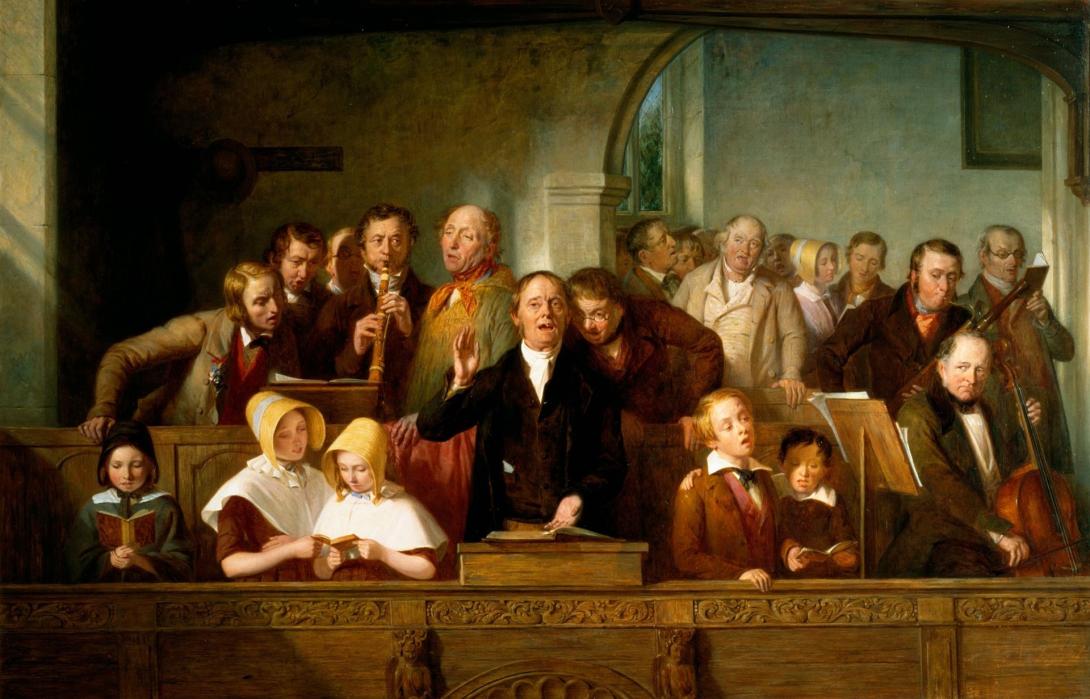
My first introduction to the music of West Gallery Quires was made when we attended a lecture at The Cecil Sharp House (home of the English Folk Dance and Song society) by Professor Ian Russell. His lecture had the catchy title of “The Paradigm of English Carolling”. He started his talk by bursting into song and singing each verse of “While Shepherds Watched Their Flocks” to a different tune – and we were hooked.
It’s not entirely clear how West Gallery music developed but it seems to have been out of a desire of the church authorities at the end of the 17th century to ‘improve the quality of psalmody’. This met with a favourable response from parishioners who wanted to do more than sit in silence and listen to a single voice singing the psalms. And whilst singing at first was strictly confined to psalms – the Word of God only being permitted in the service it was not long before hymns started to develop. The most famous perhaps being While Shepherds Watched their Flocks by Night a paraphrasing of biblical texts.
In parish records from all around the country details of the setting up of singing groups can be found and these groups would sing in the often hastily erected galleries in the west end of parish churches – hence West Gallery Quires.
Initially the groups would sing unaccompanied and the melody line was invariably given to the tenor with an underpinning bass line, with contra tenor and treble voices in addition. It would appear that the introduction of instruments was to assist the relatively untutored singers to hold their lines against other parts. Whilst fiddles were available in most village communities the price of a bass instrument would often be beyond the reach of the middling tradesmen and artisans who made up the quires. Parish subscriptions were used to purchase a cello, flute or even a serpent.
This beautiful traditional music was found in churches from around 1700 to 1850 when sadly and ironically it was driven out and suppressed by the authorities. Thomas Hardy’s novel Under the Greenwood Tree was described by the author as the story of the Mellstock Quire and its West Gallery Musicians. It was he said “a fairly true picture, at first hand, of the personages, ways and customs which were common among such orchestral bodies in the villages of the 1850s”.In the story the new vicar informs the quire that he intends to replace their traditional gallery singing and string accompaniment with an accomplished organist.
West Gallery Quires disappeared for a number of reasons – the arrival of Hymns Ancient and Modern replacing the old musicians’ books of psalms and hymns, the growing industrialisation, the Oxford Movement to name but a few. It also did not go un-noted that some who sang in the quires would often be in conflict with the squire or vicar. When the Church of England brought in harmoniums and organs and replaced the quire with surpliced choirs the West Gallery musicians either moved to Methodist chapels or sang in pubs or the streets. To this day the singing continues in and around Sheffield villages at Christmas time. We have stood and sang in pubs such at the Royal Hotel in the village of Dungworth so very tightly packed with people that the only way to ‘refresh’ drinks is to pass glasses over heads – accompanied by the refrain “pass your glasses to the bar”!
Having sat mesmerised by Professor Russell, and then having attended the Village Carol Festival in Grenoside, Sheffield (if you don’t get your application form in on the day bookings open you don’t have a chance of attending this fabulous biennial festival) we now sing with the Chiltern West Gallery Quire which meets in Welwyn Garden City once a month. The music is robust and hearty, and everyone is welcome. Our fabulous MD [musical director] spends a great deal of time researching the music of Hertfordshire composers, and our concerts are interspersed with readings from the Hertfordshire archives, so there is a fascinating blend of history and song. We start each rehearsal with a hymn known in the West Gallery world as Gibraltar: the name of the tune written by W J White of St Alban’s. It cannot help but bring a smile to your face, and reminds everyone of the appeal and joy of West Galley Music.
 Royston Choral Society
Royston Choral Society